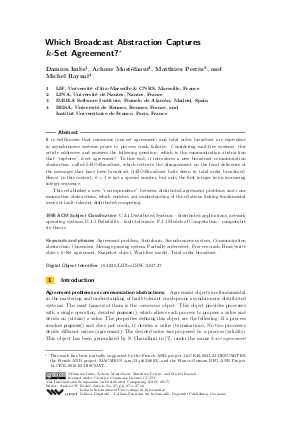Which Broadcast Abstraction Captures k-Set Agreement?
Authors Damien Imbs, Achour Mostéfaoui, Matthieu Perrin, Michel Raynal
-
Part of:
Volume:
31st International Symposium on Distributed Computing (DISC 2017)
Part of: Series: Leibniz International Proceedings in Informatics (LIPIcs)
Part of: Conference: International Symposium on Distributed Computing (DISC) - License:
 Creative Commons Attribution 3.0 Unported license
Creative Commons Attribution 3.0 Unported license
- Publication Date: 2017-10-12
File

PDF
LIPIcs.DISC.2017.27.pdf
- Filesize: 0.59 MB
- 16 pages
Document Identifiers
Subject Classification
Keywords
- Agreement problem
- Antichain
- Asynchronous system
- Communication abstraction
- Consensus
- Message-passing system
- Partially ordered set
- Process crash
Metrics
- Access Statistics
-
Total Accesses (updated on a weekly basis)
0PDF Downloads0Metadata Views
Abstract
It is well-known that consensus (one-set agreement) and total order broadcast are equivalent in asynchronous systems prone to process crash failures. Considering wait-free systems, this article addresses and answers the following question: which is the communication abstraction that "captures" k-set agreement? To this end, it introduces a new broadcast communication abstraction, called k-BO-Broadcast, which restricts the disagreement on the local deliveries of the messages that have been broadcast (1-BO-Broadcast boils down to total order broadcast). Hence, in this context, k=1 is not a special number, but only the first integer in an increasing integer sequence. This establishes a new "correspondence" between distributed agreement problems and communication abstractions, which enriches our understanding of the relations linking fundamental issues of fault-tolerant distributed computing.
Cite As Get BibTex
Damien Imbs, Achour Mostéfaoui, Matthieu Perrin, and Michel Raynal. Which Broadcast Abstraction Captures k-Set Agreement?. In 31st International Symposium on Distributed Computing (DISC 2017). Leibniz International Proceedings in Informatics (LIPIcs), Volume 91, pp. 27:1-27:16, Schloss Dagstuhl – Leibniz-Zentrum für Informatik (2017)
https://doi.org/10.4230/LIPIcs.DISC.2017.27
BibTex
@InProceedings{imbs_et_al:LIPIcs.DISC.2017.27,
author = {Imbs, Damien and Most\'{e}faoui, Achour and Perrin, Matthieu and Raynal, Michel},
title = {{Which Broadcast Abstraction Captures k-Set Agreement?}},
booktitle = {31st International Symposium on Distributed Computing (DISC 2017)},
pages = {27:1--27:16},
series = {Leibniz International Proceedings in Informatics (LIPIcs)},
ISBN = {978-3-95977-053-8},
ISSN = {1868-8969},
year = {2017},
volume = {91},
editor = {Richa, Andr\'{e}a},
publisher = {Schloss Dagstuhl -- Leibniz-Zentrum f{\"u}r Informatik},
address = {Dagstuhl, Germany},
URL = {https://drops.dagstuhl.de/entities/document/10.4230/LIPIcs.DISC.2017.27},
URN = {urn:nbn:de:0030-drops-79943},
doi = {10.4230/LIPIcs.DISC.2017.27},
annote = {Keywords: Agreement problem, Antichain, Asynchronous system, Communication abstraction, Consensus, Message-passing system, Partially ordered set, Process crash}
}
Author Details
References
-
Yehuda Afek, Hagit Attiya, Danny Dolev, Eli Gafni, Michael Merritt, and Nir Shavit. Atomic snapshots of shared memory. J. ACM, 40(4):873-890, 1993.

-
James H. Anderson. Multi-writer composite registers. Distributed Computing, 7(4):175-195, 1994.

-
Hagit Attiya and Jennifer L. Welch. Distributed computing: fundamentals, simulations and advanced topics. Wiley-Interscience, 2004.

-
Kenneth P. Birman and Thomas A. Joseph. Reliable communication in the presence of failures. ACM Trans. Comput. Syst., 5(1):47-76, 1987.

-
François Bonnet and Michel Raynal. A simple proof of the necessity of the failure detector sigma to implement an atomic register in asynchronous message-passing systems. Inf. Process. Lett., 110(4):153-157, 2010.

-
Tushar Deepak Chandra and Sam Toueg. Unreliable failure detectors for reliable distributed systems. J. ACM, 43(2):225-267, 1996.

-
Soma Chaudhuri. More choices allow more faults: Set consensus problems in totally asynchronous systems. Inf. Comput., 105(1):132-158, 1993.

-
Carole Delporte-Gallet, Hugues Fauconnier, and Rachid Guerraoui. Tight failure detection bounds on atomic object implementations. J. ACM, 57(4):22:1-22:32, 2010.

-
Faith Ellen. How hard is it to take a snapshot? In SOFSEM 2005: Theory and Practice of Computer Science, 31st Conference on Current Trends in Theory and Practice of Computer Science, Liptovský Ján, Slovakia, January 22-28, 2005, Proceedings, pages 28-37, 2005.

-
Michael J. Fischer and Michael Merritt. Appraising two decades of distributed computing theory research. Distributed Computing, 16(2-3):239-247, 2003.

- Damien Imbs, Achour Mostéfaoui, Matthieu Perrin, and Michel Raynal. Set-constrained delivery broadcast: Definition, abstraction power, and computability limits. CoRR, abs/1706.05267, 2017. URL: http://arxiv.org/abs/1706.05267.
- Damien Imbs, Achour Mostéfaoui, Matthieu Perrin, and Michel Raynal. Which broadcast abstraction captures dollarkdollar-set agreement? CoRR, abs/1705.04835, 2017. URL: http://arxiv.org/abs/1705.04835.
-
Damien Imbs and Michel Raynal. Help when needed, but no more: Efficient read/write partial snapshot. J. Parallel Distrib. Comput., 72(1):1-12, 2012.

-
Michiko Inoue, Toshimitsu Masuzawa, Wei Chen, and Nobuki Tokura. Linear-time snapshot using multi-writer multi-reader registers. In Distributed Algorithms: 8th International Workshop, WDAG '1994 Terschelling, The Netherlands, September 29 - October 1, 1994 Proceedings, pages 130-140. Springer Berlin Heidelberg, 1994.

-
Nancy A. Lynch. Distributed Algorithms. Morgan Kaufmann, 1996.

-
Michel Raynal. Communication and Agreement Abstractions for Fault-Tolerant Asynchronous Distributed Systems. Synthesis Lectures on Distributed Computing Theory. Morgan & Claypool Publishers, 2010.

-
Michel Raynal. Distributed Algorithms for Message-Passing Systems. Springer, 2013.

-
Michel Raynal. Set agreement. In Encyclopedia of Algorithms, pages 1956-1959. 2016.

-
Michel Raynal, André Schiper, and Sam Toueg. The causal ordering abstraction and a simple way to implement it. Inf. Process. Lett., 39(6):343-350, 1991.

